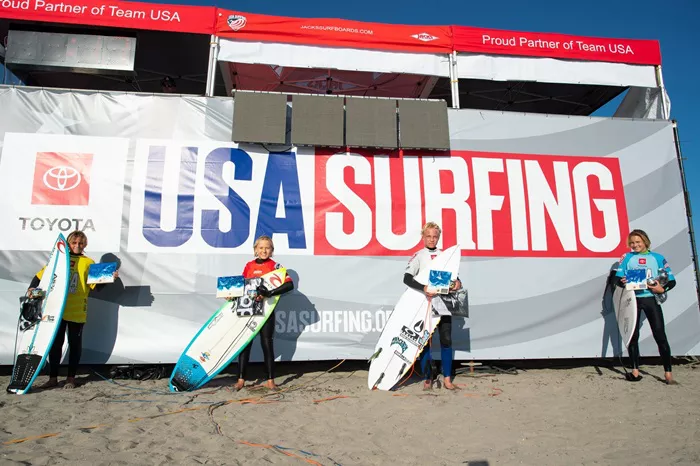As surfing prepares for another Olympic cycle, a new debate has emerged over which organization should serve as the National Governing Body (NGB) for Olympic surfing in the United States. The discussion gained momentum after U.S. Ski & Snowboard, a winter sports organization, submitted a bid to the U.S. Olympic & Paralympic Committee (USOPC) to assume this role. However, this proposal has raised concerns within the surfing community, highlighting the importance of preserving the sport’s integrity and leadership.
For over three decades, USA Surfing has been the International Surfing Association (ISA)-recognized NGB for the U.S. surfing community. USA Surfing has been pivotal in developing young athletes, organizing competitions, and supporting a wide range of surfing disciplines, including shortboard, longboard, para-surfing, and stand-up paddleboarding (SUP). Its stewardship of the sport has led to the rise of world champions and Olympic gold medalists, and it continues to build the Olympic pathway for future surfers.
Despite this track record, U.S. Ski & Snowboard has recently proposed to take over as the governing body for Olympic surfing. While U.S. Ski has extensive resources, including funding, infrastructure, and marketing experience, their interest in surfing appears to be largely financial. The organization’s CEO publicly stated that their primary goal is to deliver shortboard athletes to the Olympics and leverage commercial assets, rather than focusing on building a sustainable and inclusive foundation for the sport at all levels.
The public hearing on this matter exposed significant flaws in U.S. Ski’s proposal. One of the most glaring issues was a presentation slide that depicted a surfer riding backward on their board—an error that went uncorrected, illustrating a lack of understanding of the sport. Furthermore, U.S. Ski’s plan did not address the full spectrum of surfing disciplines governed by the ISA. Their proposal ignored the needs of juniors, para-surfers, and the longboard and SUP communities, which are essential to the development of the sport.
In contrast, USA Surfing has been a long-time advocate for these disciplines and has built a strong, grassroots infrastructure that supports surfers across all levels. The organization’s commitment to the growth of the sport is reflected in its broad base of support, which includes athletes, coaches, and institutions such as the World Surf League, the U.S. Boardriders Clubs, and the ISA. These voices, which have been integral to the sport’s Olympic journey, have expressed strong opposition to U.S. Ski’s bid, emphasizing that surfing’s leadership should remain in the hands of those who have invested in the sport’s future.
U.S. Ski & Snowboard, which currently manages 10 winter sports disciplines, has faced challenges in adequately supporting its existing athletes, with some expressing concerns about underfunding and a lack of attention. Expanding its portfolio to include surfing could further dilute the organization’s resources, potentially weakening support for its core disciplines. Surfing is not merely a commodity to be added to a sponsorship portfolio—it is a dynamic, high-performance sport that requires a dedicated and knowledgeable governing body.
Fortunately, the international surfing community is making its stance clear. The ISA, which is recognized by the International Olympic Committee (IOC) as the global governing body for surfing, has stated that it will not recognize any NGB that does not govern all of the ISA’s disciplines. Additionally, World Skate, the organization responsible for skateboarding (another sport that U.S. Ski has shown interest in), has called for a pause in the USOPC’s NGB certification process until a sport-specific applicant emerges.
The future of Olympic surfing is not about commercial opportunities—it is about athlete protection and sport integrity. USA Surfing has demonstrated that it is capable of nurturing and developing surfers at all levels, from grassroots to Olympic gold medalists. Replacing USA Surfing with an organization that lacks a deep connection to the sport risks undermining the credibility of the Olympic governance system and could have long-term negative effects on the sport’s development.
Instead of a hostile takeover, the solution lies in collaboration. U.S. Ski’s resources, infrastructure, and marketing expertise could complement USA Surfing’s established community trust, credibility, and sport-specific knowledge. By working together, both organizations can ensure that surfing remains true to its roots while benefiting from the expanded support and exposure that the Olympics can provide.
In the end, the goal should be to prioritize athletes and the sport itself, not commercial interests. USA Surfing has earned its place as the rightful leader of Olympic surfing, and its continued role as the governing body is essential to the sport’s future success on the world stage. The USOPC must recognize this and protect the Olympic future of surfing by reaffirming USA Surfing’s leadership.

